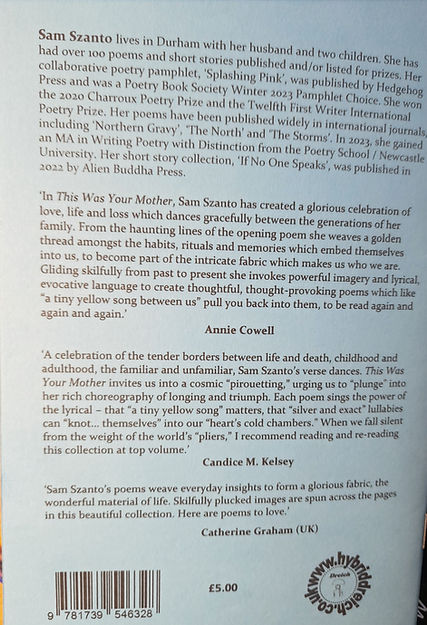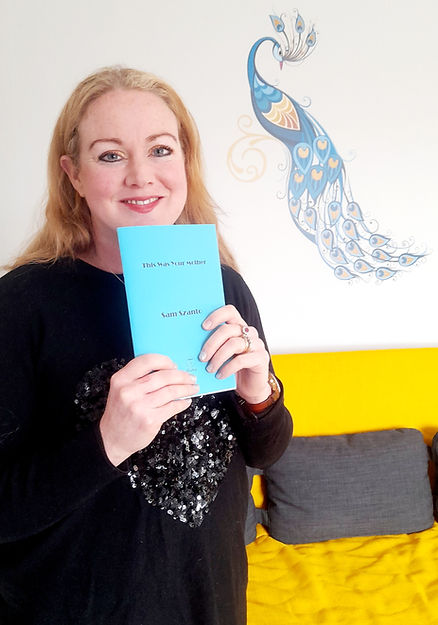Beth Brooke: "Families create their own narratives or myths"
- samszanto2
- Sep 3, 2025
- 5 min read

A chat with Beth Brooke about her book A Long Way Down (Dempsey & Windle, 2025)
How would you describe A Long Way Down in one sentence?
A Long Way Down is an exploration of my father’s life as a soldier and how his experiences also shaped me and my siblings.
How did you come up with the title?
The title comes from the final line of the opening poem. I wanted to suggest that long journey down from an intense experience back to the more mundane business of ordinary life.
What was the inspiration for the book?
I had written some poems about my childhood, particularly my childhood in Libya but they didn’t work as a collection of poems. After my mother died I was left with boxes of photographs and memorabilia to sort through. By reading the notes my father had written on the backs of some of those photos I began to see him in a different way. The poems just flowed after that. We hear so much about soldier as hero but as a society don’t care to examine the impact of conflict on soldiers and nor do we think much about how the disruptive nature of army life affects families and children. I went to ten different schools between the ages of five and eighteen. Imagine the impact of that.

Would you say the book has a theme?
In a way I think I have answered this question already. If I have to choose just a few words, the themes are love and loss.
How did you structure the pieces in the book?
If you mean sequence the pieces, that was easy. After trying to group the poems in various ways I went back to my original sequence which was to sequence them chronologically. Other structures I used were about creating two sets of linked poems: family history as myth, and myth-making. Families, in my experience, create their own narratives or myths and my myth-making sequence was structured to try and explore that. One of those pieces is actually a song lyrics written by my younger son. He had clearly listened over the years to the things I had said or his grandmother had said and used them to write about a grandfather he had never met. In the same sequence is a poem about my older son who out of the blue decided to learn Arabic. He went to Yemen, where I was born in order to do that. Where did that decision come from for a boy born and raised in Dorset? It’s almost as though that longing for the Middle East is in our DNA.
How did you decide on a publisher?
Ha! My experience as a poet is that you don’t decide on a publisher - the publisher decides on you. I had made the long list of two other publishers, had failed to get anywhere with another four publishers before deciding to enter the Brian Dempsey Memorial Prize competition run by Vole Books. I am beyond grateful to Donall and Janice Dempsey for publishing the work.
How long did the book take to write?
A couple of poems about my childhood were languishing in a file somewhere and then, after a conversation with my siblings, I started writing in earnest. I think I was writing these pieces for about a year.
Which poets inspire your work?
Well, one of the poems in this collection is an homage to TS Eliot’s Wasteland so Tom is obviously an influence. The poet I would most like to be is Seamus Heaney. I heard him read twice. He was wonderful.
What’s your writing process? i.e., do you work at a particular time of day / in a particular place? Do you need silence or can you work in a café?
I am happily retired and this means I can write whenever the mood takes me. I am a runner (though injured at the moment and so unable) and often ideas and thoughts will come while I am tramping along the lanes and fields. I also find myself drafting something on my phone very early in the morning while I am still in bed!
How is the book similar or different to what you’ve written before?
This is my fourth book. Two of my previous books, A Landscape With Birds and Chalk Stories relate very much to place. A Long Way Down also includes poems which focus on landscape and the places that, however briefly, were home. One of my books, Transformations, contains poems which are a response to the work of the artist, Dame Elisabeth Frink. Frink’s work dealt with our propensity for violence, a theme which arose as a result of her own wartime experiences. In that sense there is a link.

Have you any readings or other events planned to promote the book?
My in-person launch took place on 22nd August and my publisher is giving me an online launch on 12th September. I am reading and doing a q&a for Trowbridge stanza next week and a reading in Wells in the spring. I need to try and find some other venues - suggestions or invitations welcomed!
The note on the back mentions that this a story told through the lens of your own family’s experience. I wonder whether this raised any ethical questions for you and how your family who are still living feel about the story being told?
Obviously it did. I am the youngest of five. Both my parents and my oldest brother (the Telemachus of Family History As Myth) are dead and my oldest sister is suffering from Alzheimer’s; she no longer knows who we are. My other sister came to my launch and was really proud of what I had done. I think in a way the poems offered us all some healing and closure. Certainly there is one poem, 'PTSD' where she and my brother agreed that I had described things absolutely right.
I’m interested in your use of myth, which as the cover note says, frames the book as ‘universal’. I wonder if you chose to use the Odysseus myth because it’s one that people can easily identify with or if there was another reason? I wonder if using myth is a way of stepping away – or letting the reader step away – from a greater emotional engagement with a personal story?
An interesting question. I think in some ways using the Odysseus story helps some readers to bridge the particular to the general. I was worried that these poems would not find a publisher because they could be considered too personal or niche. Lots of editors are much younger than me and what I was writing about perhaps didn’t resonate with their own life experiences. Using the Odysseus myth was therefore a way in.
Buy the book here:










Comments